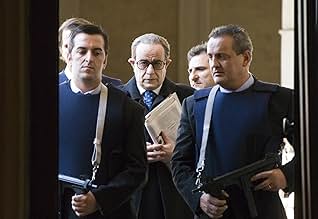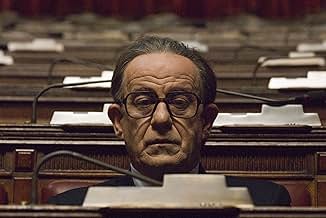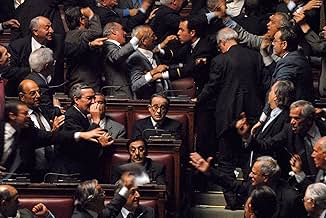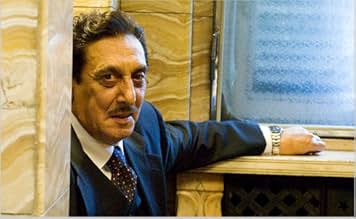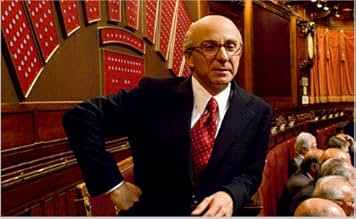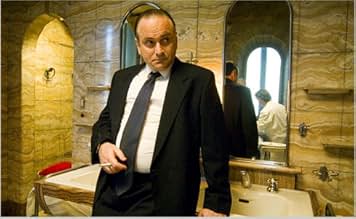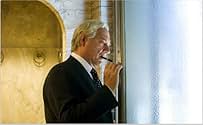VALUTAZIONE IMDb
7,2/10
19.927
LA TUA VALUTAZIONE
La storia del politico italiano Giulio Andreotti, che è stato Primo Ministro in Italia sette volte dalla restaurazione della democrazia nel 1946.La storia del politico italiano Giulio Andreotti, che è stato Primo Ministro in Italia sette volte dalla restaurazione della democrazia nel 1946.La storia del politico italiano Giulio Andreotti, che è stato Primo Ministro in Italia sette volte dalla restaurazione della democrazia nel 1946.
- Candidato a 1 Oscar
- 32 vittorie e 40 candidature totali
Recensioni in evidenza
A film to admire but impossible to love. Not an ounce of humanity to cling on to. Splendidly put together but only with the intellect so, for non Italians a puzzle that seems like a figment of someone's imagination and to be taken as a sort of intellectual metaphor. How can a creature from hell in good terms with the Catholic Church can survive all this years and when I say survive I mean survive from every possible angle. Italians know that is not only true but normal. I'm half Italian so I know what I'm talking about. Andreotti is played by Paolo Servillo in a performance that is part caricature, part faithful portrait, a work of genius and I suspect that the slightly surreal, grotesque undertones, allowed the movie to be made and succeed in the way it did, at least in Italy. I saw it in New York where I was the only spectator in the theater. I can't wait to see where director Sorrentino will take us next.
Biographical films tend to be respectful to the historical figures that they describe. Even when they describe complex and controversial characters they try to explain and to put in context the motivation of deeds which in the perspective of history seem evil. Paolo Sorrentino's 'Il Divo' is quite the contrary, it is a negative biography about a character who dominated the Italian politics for most of the second part of the 20th century, the leader of the Christian-Democratic Party and seven-times Prime Minister of Italy, Giulio Andreotti. The film does not lack complexity - quite the contrary - and the historical context of the 80s and 90s is described in detail, but the effect is willingly opposite than in usual biographies. Even political actions which would have seen candid or neutral seem to catch a strong significance and are seen through the perspective of the corruption and Mafia-relations which seem to have dominated Italian political life of the period.
My knowledge about the Italian politics is too superficial to make a definite judgment about the correctness of the facts presented on screen. What I can say after seeing the film is that it does not seem to pretend to be objective. Even if there is no explicit statement, there is neither any positive angle we brought into the film or positive dimension that is not questioned. Even the relationship with his wife ('I knew all these years what kind of man I married') or helping the poor (which looks more like a political exercise deprived of sincerity). There are however many other scenes (like the repeated walk on empty streets surrounded by cohorts of security people, the reception after his last nomination as Prime Minister) which describe not only the outer-worldness of the man, but also of the whole system.
Even more amazing is the fact that Andreotti was alive when this film was made (he actually died about a month ago) and has seen at least part of the film, allegedly walking out after a while. So this is not only a biography, but a pamphlet directed against a living politician. Andreotti, by the way, was no stranger to the Italian cinema industry, he played an important role in establishing the rules that protected the local industry against foreign (especially Hollywood) imports in the 50s, but also the establishment of a de-facto censorship over the content of the productions which was in place for many decades. Is this film also kind of a revenge of the now free industry over this character? Maybe.
To a very large extent 'Il DIvo' relies on the extraordinary acting performance of Toni Servillo. He makes one of these creations which in time tend to superpose and replace the visual representation we have about the real-life person. Great acting indeed, but do we end by understanding better Giulio Andreotti the man? I doubt it. Paolo Sorrentino certainly knows how to construct complex characters which do not show easily their intense internal beings. Looking now retrospectively he did the same thing in This Must Be the Place (which he made later, but I saw it before). He does not however serve the viewers with ready prepared answers about the motivation of his heroes. I knew very little about Andreotti before seeing this film, I know many more facts now, but the man remains a mystery.
My knowledge about the Italian politics is too superficial to make a definite judgment about the correctness of the facts presented on screen. What I can say after seeing the film is that it does not seem to pretend to be objective. Even if there is no explicit statement, there is neither any positive angle we brought into the film or positive dimension that is not questioned. Even the relationship with his wife ('I knew all these years what kind of man I married') or helping the poor (which looks more like a political exercise deprived of sincerity). There are however many other scenes (like the repeated walk on empty streets surrounded by cohorts of security people, the reception after his last nomination as Prime Minister) which describe not only the outer-worldness of the man, but also of the whole system.
Even more amazing is the fact that Andreotti was alive when this film was made (he actually died about a month ago) and has seen at least part of the film, allegedly walking out after a while. So this is not only a biography, but a pamphlet directed against a living politician. Andreotti, by the way, was no stranger to the Italian cinema industry, he played an important role in establishing the rules that protected the local industry against foreign (especially Hollywood) imports in the 50s, but also the establishment of a de-facto censorship over the content of the productions which was in place for many decades. Is this film also kind of a revenge of the now free industry over this character? Maybe.
To a very large extent 'Il DIvo' relies on the extraordinary acting performance of Toni Servillo. He makes one of these creations which in time tend to superpose and replace the visual representation we have about the real-life person. Great acting indeed, but do we end by understanding better Giulio Andreotti the man? I doubt it. Paolo Sorrentino certainly knows how to construct complex characters which do not show easily their intense internal beings. Looking now retrospectively he did the same thing in This Must Be the Place (which he made later, but I saw it before). He does not however serve the viewers with ready prepared answers about the motivation of his heroes. I knew very little about Andreotti before seeing this film, I know many more facts now, but the man remains a mystery.
Giulio Andreotti is the seven times Prime Minister of Italy leading the ruling Christian Democracy Party. In 1978, The Red Brigades kidnaps his rival former Prime Minister Aldo Moro. Andreotti refuses to negotiate and Moro is killed. Over the next 15 years, various people are mysteriously killed. In 1991, he's named Senator for Life. In 1992, he resigns as Prime Minister. His bid for the Presidency fails and he goes on trial for corruption with the Mafia.
I have one problem with this movie and it's a big one. I feel like I did a PhD on Italian politics watching this movie. The first half is nearly impossible to follow for someone like me who knows nothing about Italy during this time. It's a lot of style but I couldn't understand the substance. There are a lot of deaths but I don't know the significance of some of them. The second half is more compelling with the criminal trial. It becomes a character study and Andreotti is an intriguing character. I'm sure this movie is much more compelling for people with a background in Italian politics during this time. A lot of this is going over my head.
I have one problem with this movie and it's a big one. I feel like I did a PhD on Italian politics watching this movie. The first half is nearly impossible to follow for someone like me who knows nothing about Italy during this time. It's a lot of style but I couldn't understand the substance. There are a lot of deaths but I don't know the significance of some of them. The second half is more compelling with the criminal trial. It becomes a character study and Andreotti is an intriguing character. I'm sure this movie is much more compelling for people with a background in Italian politics during this time. A lot of this is going over my head.
This is a film of two parts - something which a previous comment didn't really make clear - we see the events of Italy during Andreotti's reign in the first half from Andreoti's point of view: then in the second half we see the same events again from (depending on your perspective) either a more dispassionate or a more disparaging observation.
As a bit of cinema it is brilliant (one or two IMO rather silly unslick bits of special FX, just ignore them!) but altogether not to be missed. I doubt that it will translate well, and even for a seasoned appassionato of Italian politics the introduction of characters using (clever) superimposed text was flawed by the overshort screen time which these important notes were allowed.
As a bit of cinema it is brilliant (one or two IMO rather silly unslick bits of special FX, just ignore them!) but altogether not to be missed. I doubt that it will translate well, and even for a seasoned appassionato of Italian politics the introduction of characters using (clever) superimposed text was flawed by the overshort screen time which these important notes were allowed.
I've heard several American viewers complain that this film is all style over substance. I couldn't disagree more.
I think that if a viewer is familiar with Italian Political History then this film comes off as absolutely breathtaking, and not just for its amazing filmic style. For one, the performances and interpretations of these real characters are spot on and for another the intelligence and courage to which the script approaches the ethical implications of Il Divo's actions, the breadth of moral exploration, how he defends himself to himself, to others and, often, directly to the viewer, is a welcomed shock and dose of complexity to the often polemic and overly-reductive discourse in Italian politics (not much different than here in the States in that regard). Lastly, for Italians, these events resonate incredibly and speak very much to the current power base in Italy. I truly feel that a lot of Americans are watching this film with cultural blinders on.
I won't lie, it is definitely designed for people that already have a strong grasp of the history. It doesn't weigh itself down with long explanations and exposition (except in text at the beginning and end of the film) so if you're coming to this to learn every sordid detail about its subject, or for a plot, even, then you might not find much reward in it. But as an exercise in unpacking a very complicated subject with real style, it's amazing!
I think that if a viewer is familiar with Italian Political History then this film comes off as absolutely breathtaking, and not just for its amazing filmic style. For one, the performances and interpretations of these real characters are spot on and for another the intelligence and courage to which the script approaches the ethical implications of Il Divo's actions, the breadth of moral exploration, how he defends himself to himself, to others and, often, directly to the viewer, is a welcomed shock and dose of complexity to the often polemic and overly-reductive discourse in Italian politics (not much different than here in the States in that regard). Lastly, for Italians, these events resonate incredibly and speak very much to the current power base in Italy. I truly feel that a lot of Americans are watching this film with cultural blinders on.
I won't lie, it is definitely designed for people that already have a strong grasp of the history. It doesn't weigh itself down with long explanations and exposition (except in text at the beginning and end of the film) so if you're coming to this to learn every sordid detail about its subject, or for a plot, even, then you might not find much reward in it. But as an exercise in unpacking a very complicated subject with real style, it's amazing!
Lo sapevi?
- QuizThe first cut of the movie was 145-minute long.
- Citazioni
Giulio Andreotti: I know I am an average man but looking around I do not see any giant.
- Curiosità sui creditiEnd credits features the following dedication: "per Daniela, che mi ha salvato" ("for Daniela, who saved me"). Daniela D'Antonio is Paolo Sorrentino's wife.
- ConnessioniFeatured in The 82nd Annual Academy Awards (2010)
- Colonne sonoreLa prima cosa bella
Written by Mogol, Gian Piero Reverberi and Nicola Di Bari
Performed by Ricchi e Poveri
Published by Universal Music Publishing Ricordi S.r.l.
Courtesy of EMi Music Italy S.p.a.
I più visti
Accedi per valutare e creare un elenco di titoli salvati per ottenere consigli personalizzati
- How long is Il Divo?Powered by Alexa
Dettagli
- Data di uscita
- Paesi di origine
- Lingue
- Celebre anche come
- Il divo - La spettacolare vita di Giulio Andreotti
- Luoghi delle riprese
- Via del Corso, Roma, Lazio, Italia(graffiti on the wall)
- Aziende produttrici
- Vedi altri crediti dell’azienda su IMDbPro
Botteghino
- Budget
- 5.700.000 € (previsto)
- Lordo Stati Uniti e Canada
- 240.159 USD
- Fine settimana di apertura Stati Uniti e Canada
- 13.867 USD
- 26 apr 2009
- Lordo in tutto il mondo
- 11.260.366 USD
- Tempo di esecuzione
- 1h 50min(110 min)
- Colore
- Mix di suoni
- Proporzioni
- 2.35 : 1
Contribuisci a questa pagina
Suggerisci una modifica o aggiungi i contenuti mancanti


